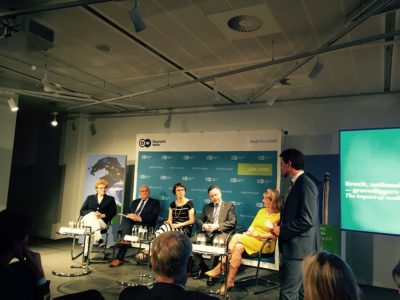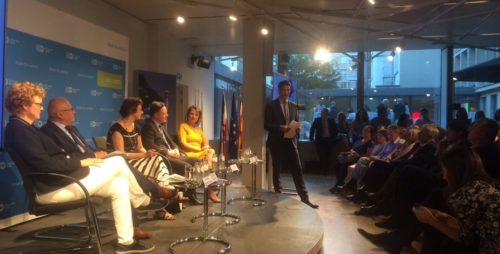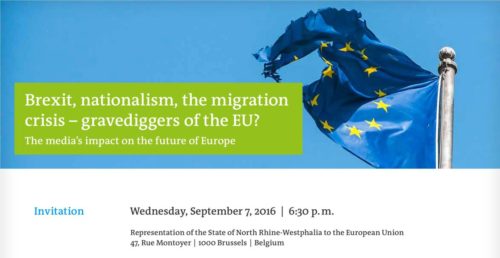The room was full last Wednesday when the four speakers were debating about the influence of the media on the Brexit. The moderator was Max Hofmann, the DW’s Bureau Chief in Brussels. He introduced the subject with a short video resuming the current situation : An apparent migrant crisis with the numerous images of a stream coming to Europe, and the rising of far-right political personalities’ popularity such as Marine Le Pen, Geert Wilders or Nigel Faerage. They all have the desire to create a link between immigration, terrorism and the EU. The main question that was raised during the debate is the role of media in politics and in particular in the decision of the United Kingdom to leave the EU. Could the British media have changed the result of the referendum if they would have informed the population better? And what is exactly the role of the media: challenging political decisions and discussions or rather just transfer what the politicians are trying to say? These are the questions Professor Péter Balázs, Monika Hohlmeier, Agnieska Romaszewska, Alyn Smith and Barbara Wesel were asked to answer.

From right to left: Monika Hohlmeier, Professor Péter Balazs, Agnieska Romaszewska, Alyn Smith, Barbara Wesel and the moderator Max Hofmann
Twitter: @mdeboer
According to MEP Monika Hohlmeier (Germany, EPP), politicians make the news more easily by blaming the European Union on many issues. The reason why the British population decided to leave the EU was that they were not well informed. Actually many problems are due to the fact that member states do not entail their own obligation so no common strategy can be found. As Alyn Smith said later “We cannot blame Europe for not exercising powers it doesn’t have”.
Agnieska Romaszewska, Editor-in-Chief of Belsat TV, felt “strange” because she considers herself as the only political moderate person of the panel. She pointed out the lack of accuracy when we are talking about far-right and moderate right parties. For her the biggest problems of the EU are the lack of communication within the union and its double standard. If the West only cares about the refugees from the Middle East, it turns a blind eye on the “1.5 million Ukrainian refugees in Poland” (note that Agnieska Romaszewska corrected herself on her Twitter account the day after that she meant “migrants” and not “refugees”).
For Barbara Wesel, senior Europe correspondent for DW since 2014, the ones to blame are the powerful people behind the newspapers such as Murdoch, Davidoff and other foreign billionaires that have the direct control over information. According to her the refugee debate is full of lies, in fact in her opinion we have not seen as many lies in the political coverage since the cold war.
Alyn Smith, MEP of Scotland, stresses out that the desire to be independent has nothing to do with a euro-scepticism. The issue of the Brexit referendum is clearly the result of how the media handled it. “If the public is not informed it cannot make proper decisions”. On the other hand, he thinks that the politicians say what the newspapers want to hear. Alyn Smith and Barbara Wesel agree on the urge for the media to have a different role than just stating the facts. To the question of Max Hoffman about the reason why BBC tried and failed to report Brexit rationally, Alyn Smith said that BBC indeed did fail but he is not sure if they even tried.
Professor Péter Balázs, former Foreign Minister of Hungary before Victor Orban’s mandate, thinks that the media fueled the narrative of nationalism. Indeed a referendum on forced immigration will occur in Hungary in a few months and Páter Balázs affirms that there are more advertisements to stop immigration than actual refugees. Nevertheless he points out that the real problem is the lies of the politicians and the media cannot be guilty.

Twitter: @SchamsEU
At the end of the panel discussion Hofmann asked to evaluate the British media on the coverage of the Brexit. None of the speakers was willing to give them more than an average rating. Therefore we can conclude that they do agree: In reality the media is partly responsible for the outcome of the referendum. There is less cohesion in a world where the possibility of communication is larger than ever. The migration crisis creates the global feeling that we are out of control. This and related feelings are easy to shape for populist parties. Even though journalism has limits, it should never prevent the communicators from doing their job of informing people.

